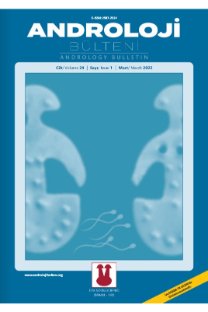Yerli popülasyon ve mülteci hasta gruplarında azospermi oranları ve etkileyen faktörler
AMAÇ: Hastanemize erkek infertilitesi şikayetiyle başvuran yerli popü-lasyon/mülteci hasta gruplarında saptanan azospermi oranları ve buna etki etmesi olası faktörler değerlendirildi. GEREÇ ve YÖNTEM: Kliniğimizde Ocak 2017 ile Temmuz 2018 yılla-rı arasında erkek infertilitesi nedeniyle başvuran ve azospermi saptanan 626 hasta retrospektif olarak değerlendirildi. Çalışmaya alınan hasta-lar yerli popülasyon ve mülteciler olarak iki gruba ayrıldı. Mülteciler de kampta yaşayanlar ve kamp dışında yaşayanlar olarak ayrıca değer-lendirildi. Hastaların yaş, serum Folikül stimülan hormon, Lüteinizan hormon, total Testosteron düzeyleri, skrotal ultrasonografi sonuçları, varikosel varlığı ve varikoselektomi operasyonu bilgileri değerlendirildi. BULGULAR: Yerli popülasyonda azospermik hasta sayısı %12,4 (377) iken mültecilerde bu sayı %17,4 (249) idi. Azospermik hasta sayısı mül-teci hasta grubunda yerli popülasyon grubuna göre istatistiksel olarak anlamlı derecede yüksek saptandı (p
Azoospermia rates and affecting factors in local population and refugee patient groups
OBJECTIVE: In this study we aimed to evaluate the rates of azoospermia in the local population/refugee patient groups and parameters that may have an effect who were applied to our hospital with male infertility. MATERIAL and METHODS: We evaluated 626 patients with male infertility who were diagnosed with azoospermia between January 2017 and July 2018 retrospectively. The patients were divided into two groups as local population and refugees. Refugees were also divided as campers and living outside the camps. Age, serum follicle stimulating hormone, luteinizing hormone, total testosterone levels, scrotal ultrasonography (usg) results, presence of varicocele and varicocelectomy operation were evaluated. RESULTS: The number of azoospermic patients was 12.4% (377) in local population, this number was 17.4% (249) in refugees. The number of azoospermic patients was significantly higher in the refugee patient group compared to the local population group (p
___
- Singh A, Koner BC, Ray PC, Prasad S, Jamatia E, Masroor M, Singh VK. Effect of CYP1A1 gene polymorphism and psychological distress on seminal analysis parameters. Reprod Health 2016;13:60. [CrossRef ]
- Kızılkan Y. Non-Obstrüktif Azospermili Hastalarda Mikroskobik Testiküler Sperm Ekstraksiyonu Operasyonu Öncesi Sperm Bulma İhtimalini Etkileyen Parametreler. Uzmanlık tezi, Ankara, 2015.
- Eskiocak S, Gozen AS, Taskiran A, Kilic AS, Eskiocak M, Gulen S. Effect of psychological stress on the L-arginine-nitric oxide pathway and semen quality. Braz J Med Biol Res 2006;39:581–8. [CrossRef ]
- Abou-Saleh MT, Christodoulou GN. Mental health of refugees: global perspectives. BJPsych Int 2016;13:79–81. [CrossRef ]
- Bhongade MB, Prasad S, Jiloha RC, Ray PC, Mohapatra S, Koner BC. Effect of psychological stress on fertility hormones and seminal quality in male partners of infertile couples. Andrologia 2015;47:336–42. [CrossRef ]
- Wogatzky J, Wirleitner B, Stecher A, Vanderzwalmen P, Neyer A, Spitzer D, et al. The combination matters - distinct impact of lifestyle factors on sperm quality: a study on semen analysis of 1683 patients according to MSOME criteria. Reprod Biol Endocrinol 2012;10:115. [CrossRef ]
- Smeekes A, Verkuyten M, Çelebi E, Acartürk C, Onkun S. Social identity continuity and mental health among Syrian refugees in Turkey. Soc Psychiatry Psychiatr Epidemiol 2017;52:1317–24. [CrossRef ]
- Sijbrandij M, Acarturk C, Bird M, Bryant RA, Burchert S, Carswell K, et al. Strengthening mental health care systems for Syrian refugees in Europe and the Middle East: integrating scalable psychological interventions in eight countries. Eur J Psychotraumatol 2017;8(Suppl 2):1388102. [CrossRef ]
- Wdowiak A, Bień A, Iwanowicz-Palus G, Makara-Studzińska M, Bojar I. Impact of emotional disorders on semen quality in men treated for infertility. Neuro Endocrinol Lett 2017;38:50–8.
- Bártolo A, Reis S, Monteiro S, Leite R, Montenegro N. Psychological Adjustment of Infertile Men Undergoing Fertility Treatments: an Association with Sperm Parameters. Arch Psychiatr Nurs 2016;30:521–6. [CrossRef ]
- Nordkap L, Jensen TK, Hansen ÅM, Lassen TH, Bang AK, Joensen UN, et al. Psychological stress and testicular function: a cross-sectional study of 1,215 Danish men. Fertil Steril 2016;105:174– 87.e2. [CrossRef]
- Alpak G, Unal A, Bulbul F, Sagaltici E, Bez Y, Altindag A, et al. Post-traumatic stress disorder among Syrian refugees in Turkey: a cross-sectional study. Int J Psychiatry Clin Pract 2015;19:45–50. [CrossRef]
- Pelit ES, Katı B, Akın Y, Yeni E. Çevresel stres faktörlerinin sperm hücreleri üzerine etkisi. Androl Bul 2017;19:61−4. [CrossRef]
- Esmaeili V, Shahverdi AH, Moghadasian MH, Alizadeh AR. Dietary fatty acids affect semen quality: a review. Andrology 2015;3:450–61. [CrossRef]
- Braga DPAF, Halpern G, Figueira RCS, Setti AS, Iaconelli A Jr, Borges E Jr. Food intake and social habits in male patients and its relationship to intracytoplasmic sperm. Fertil Steril 2012;97:53–9. [CrossRef]
- Patel A, Sharma PSVN, Narayan P, Nair BVS, Narayanakurup D, Pai PJ. Distress in Infertile Males in Manipal-India: A Clinic Based Study. J Reprod Infertil 2016;17:213–20.
- Eskiocak S, Gozen AS, Kilic AS, Molla S. Association between mental stress & some antioxidant enzymes of seminal plasma. Indian J Med Res 2005;122:491–6.
- Giwercman A, Bonde JP. Declining male fertility and environmental factors. Endocrinol Metab Clin North Am 1998;27:807–30. [CrossRef]
- ISSN: 2587-2524
- Yayın Aralığı: Yılda 4 Sayı
- Başlangıç: 1999
- Yayıncı: Turgay Arık
Sayıdaki Diğer Makaleler
Obstruktif uyku apne sendromu’nun kadın cinsel fonksiyonu ve memnuniyete olan etkisi
Coşkun KAYA, YELİZ KAYA, Serkan CEYHAN
SEMİH TAN, Mehmet Caner ÖZER, Nazlı ÇİL, MURAT SERKANT ÜNAL
İdiyopatik erkek infertilitesinde probiyotiklerin yeri
Turgay AKGÜL, ENGİN DOĞANTEKİN, KORAY AĞRAS
Yerli popülasyon ve mülteci hasta gruplarında azospermi oranları ve etkileyen faktörler
